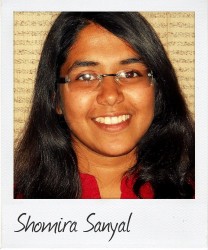"The ACU Summer School 2014 on Global Food Security"
October 6th, 2014 Learning about global food security means knowing about rice production, biodiversity, women in agriculture and climate change, as Shomira Sanyal, 20, a Commonwealth Correspondent from New Delhi in India, discovered while attending summer school hosted by the Association of Commonwealth Universities.
Learning about global food security means knowing about rice production, biodiversity, women in agriculture and climate change, as Shomira Sanyal, 20, a Commonwealth Correspondent from New Delhi in India, discovered while attending summer school hosted by the Association of Commonwealth Universities.
‘Global Food Security: Can We Feed A Growing World?’ The theme for the 4th Association of Commonwealth Universities (ACU) Summer School aptly brought to light one of the largest and most pressing issues facing the world today.
Held at the University of Nottingham Malaysia Campus (UNMC), the Summer School was an excellent mix of workshops, keynote lectures and field trips, apart from the interactions and dialogues among the 36 participants from across the Commonwealth countries!
The ACUSS14 began with delegates and dining together, followed by a team-building workshop led by faculty of the UNMC the next day. The workshop included various exercises among the groups that the delegates had been divided into, aimed at ensuring clearer communication and organised participation, which proved to be a helpful learning tool and practice for the future.
The delegates were taken on the same day for a visit to the Crops for the Future Research Centre (CFFRC), a joint venture by the UNMC and Bioversity International. The CFFRC, an international organisation, works and conducts research on underutilized and neglected crops such as bambara groundnuts. The visit provided an excellent insight into the novel research being conducted in order to address the issue of food security, the details of which were later substantiated through a presentation by Prof. Sean Mayes of the UNMC. This was followed by an enlightening talk on ‘Arsenic in Rice’ by Dr. Paul N. Williams of Queen’s University, Belfast, who spoke at length about the effects of the chemical on rice production and consumption, and its adverse effects.
A talk on ‘Climate Change and Global Food Security’ by Dr. Richard Warrick of Curtin University, Australia, was first on the agenda the next day. He spoke about the various causal links in the climate change issue with that of food security. This was followed by a workshop dealing with making and presenting effective posters. The delegates then departed for the Kuala Selangor Nature Park, where Dr. Cecilia Rocha from Ryerson University, Toronto spoke on ‘Policies for Food and Nutrition Security: Recent Developments in Brazil’, wherein she talked about Brazil’s concerted efforts to accomplish the Millennium Development Goals around food security. After her lecture, the delegates participated in a highly engaging and competitive World Trade Game, and later went for a nature (and firefly) trail the same night with Prof. Stephanie Evers.
The next day began with the delegates undertaking a trek in the peat swamps located in the vicinity of Kuala Selangor Nature Park, and visiting paddy fields and understanding crop production systems. The day ended with a traditional, and extremely delicious, satay dinner.
Dr. Tasokwa Vida Kakota from Lilongwe University of Agriculture and Natural Resources (LUANAR), Malawi spoke the following day on ‘Gender Adaptation and Climate Change: Implications on Food Security’. She discussed at length women’s role in food production and the ramifications of those roles. The groups had to begin working on and submit their final posters on the same day. The interesting thing to note is that groups were divided on the basis of various factors related to food security, for example, Biotechnology, Environment, Demographic and Migration, Supply Chain, Food and Nutrition, Sustainability, Farm Management and Food Policy. Once done with this exhausting yet wonderful brainstorming exercise, the last session conducted by Ms. Joyce Achampong, Director of External Engagement at the ACU, involved the delegates giving solutions to questions related to the theme: ‘The world beyond 2015: Is higher education ready?’ After this session, the delegates were treated to a traditional Lok Lok dinner at the end of the day.
Delegates also visited the Mini Malaysia and ASEAN Cultural Park (MMACP), and participated in a treasure hunt on the famous Jonker Street in Melaka. They were taken to Kuala Lumpur, where they had to present their posters, engage in a discussion on them, and enter them in a competition! With free time in the evening on their hands, most of the participants visited places in Kuala Lumpur, the main attraction being the Petronas (Twin) Towers, as well as the Heritage Site – the Central Market.
The ACUSS14 came to an end the same night with a formal dinner that included guest speakers the CEO and Provost of UNMC, Ms. Christine Ennew and Prof. Christopher Hill, Director, Research Training and Academic Development-UNMC, the award ceremony and certificate distribution. The next day saw people bidding farewell and leaving for their different countries.
The Summer School was an enriching and exhilarating experience for everyone. Participants came from countries like Nigeria, South Africa, the UK, Australia, India, Bangladesh, Pakistan, Sri Lanka, Uganda, Mauritius and many others. They belonged to different age groups and a spectrum of occupations and courses of study ranging from law, nutrition and farm science on the one end to geography, industrial planning, and sociology at the other. Everyone took back with them a deeper understanding of the issue of food security, the knowledge that despite coming from different cultures, societies and countries, the problems are common; and of course, the valuable interactions with one another. Excellently organized by the ACU and UNMC, the ACUSS14 was a satisfying and fulfilling experience to have been a part of, and one hopes that all the attendees will seriously pursue it further!
Photo credit – UNMC Graduate School
………………………………………………………………………………………………………………
About me:
I am pursuing a Bachelor’s Degree in Sociology at Lady Shri Ram College, New Delhi. I enjoy reading, travelling and meeting people. I have deep interest in developmental work that will improve the lives of India’s marginalized, and have worked in rural India with NGOs and movements on the Right to Information, the Right to Food, the Public Distribution System, and the Mahatma Gandhi National Rural Employment Guarantee Scheme. I believe in the Gandhian saying, “Be the change you want to see”.
………………………………………………………………………………………………………………
Opinions expressed in this article are those of the author and do not necessarily represent the views of the Commonwealth Youth Programme. Articles are published in a spirit of dialogue, respect and understanding. If you disagree, why not submit a response?
To learn more about becoming a Commonwealth Correspondent please visit:
http://www.yourcommonwealth.org/submit-articles/commonwealthcorrespondents/
………………………………………………………………………………………………………………




